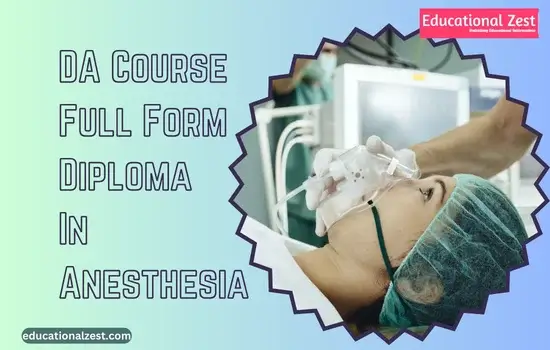The da course full form is Diploma In Anesthesia. In the fast-paced world of healthcare, specialists in anesthesia play a critical role in ensuring patient comfort and safety during surgical procedures. The Diploma in Anesthesia, a two-year postgraduate program, equips individuals with the essential skills and knowledge to excel in this vital field. In this article, we explore the nuances of this program, its eligibility criteria, future prospects, and salary expectations.

What the Course is About?
The Diploma in Anesthesia teaches anesthesia basics and applications. Participants learn how to administer anesthesia and keep patients safe throughout surgery via a demanding program. Before, during, and after surgery, the curriculum encompasses anesthesia, monitoring, and care. Clinical rotations and hands-on instruction provide students practical experience. They learn to assess patients, pick anesthesia, and monitor vital signs throughout surgery. Curriculum requires multidisciplinary healthcare teams to cooperate.
Eligibility Criteria
Diploma in Anesthesia candidates must qualify. Program admission is generally based on merit and class 12 final exam scores. Candidates must also have earned at least 50% in 10+2 physics, chemistry, and biology courses. Postgraduate diploma candidates must have a least 50% MBBS or B.Pharm from a recognized Indian university. Class 10 qualifying scores are usually 45%.
Future Scope
The Diploma in Anesthesia is promising, reflecting the increased demand for qualified healthcare workers. This curriculum is appropriate preparation for BSc or MBBS. These higher qualifications improve career prospects and growth in radiology, cardiology, and perfusion technology. The certificate provides graduates broad skills sought for in many healthcare fields. Many hospitals use anesthetic technicians to help surgeons and maintain patient safety. Laboratory and machine manufacturers require skilled anesthetic equipment and technology researchers and developers.
Career Options: Diploma in Anesthesia graduates have several exciting healthcare careers. Assistant anesthesiologists assess patients, monitor vital signs, and provide anesthesia before, during, and after surgery. Their expertise improves patient comfort and safety during surgery, making them vital healthcare team members. Another profitable diploma career is nurse anesthetist. Pain treatment, medicine delivery, and surgical anesthetic depend on these professionals.
Salary
Anesthesia diploma holders’ salaries depend on their knowledge, abilities, corporate reputation, and position. All these elements impact field pay. Anesthesia graduates average 5–15 lakh per year. Individual circumstances and market movements may affect its value. Experts with significant abilities and practical expertise may earn higher remuneration for their healthcare industry contributions. Some companies provide better pay. Senior anesthesiologists and consultants earn more owing to their expertise.
All things considered, it can be said that this DA curse is the best option when it comes to entering into the healthcare field and making a career. The course is no doubt challenging, but those who can complete it can get great job opportunities. The ones having a proper idea about patient and care can surely get proper opportunities in this course.